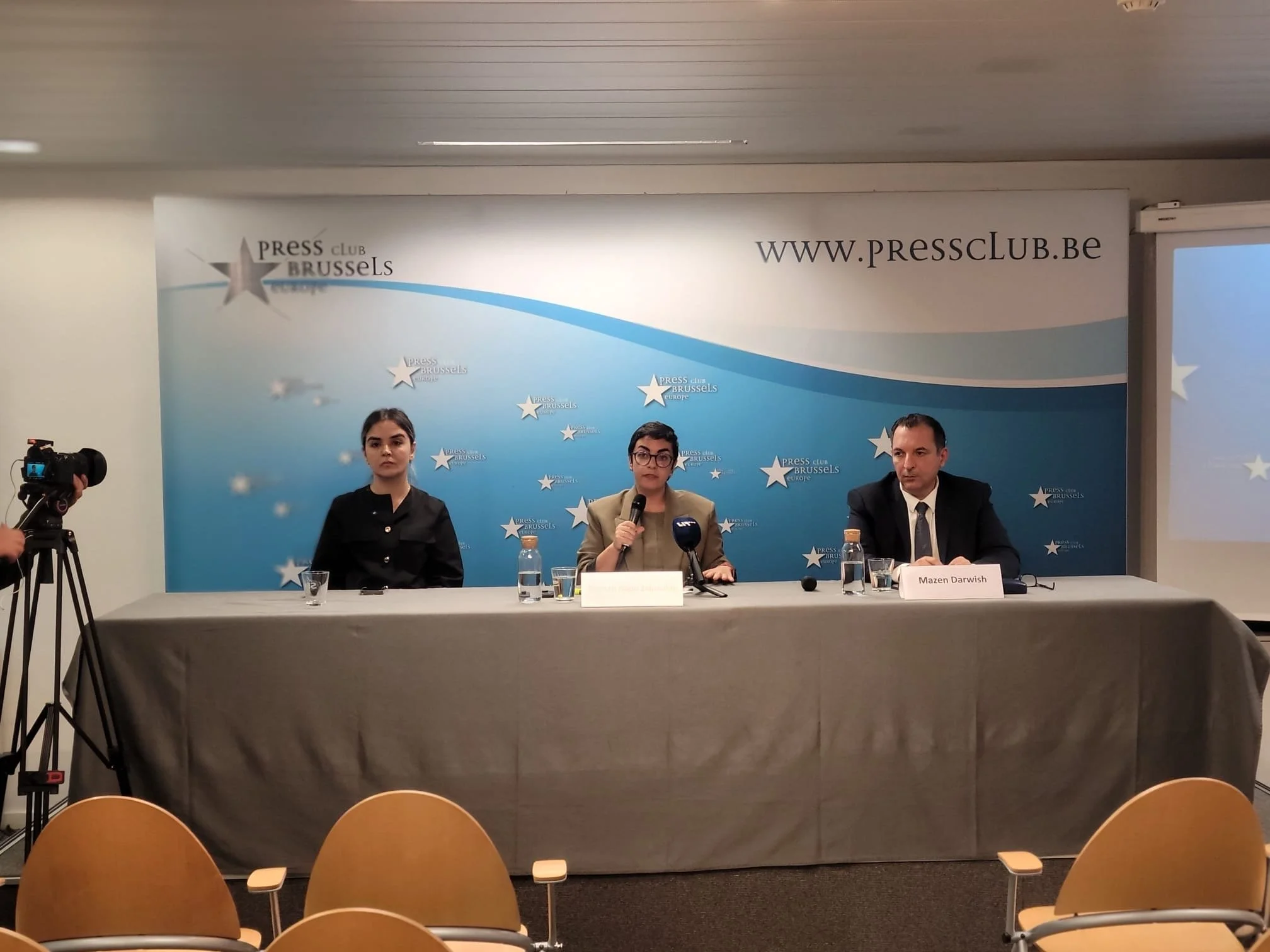Press Conference on Rapprochement with the Assad Regime and the Increasing Violations Against Syrian Refugees
Ahead of the conference, Madaniya, and the organising committee, shared a position statement with key stakeholders, including the European External Action Service, France, Germany, The Netherlands, Austria, Italy, Greece, Turkey, the UK, the United States, and the United Nations Office of the Special Envoy to Syria. This paper outlined the risks of rapprochement with Assad and its potential to undermine international law, humanitarian principles, and peace-building efforts. Driven by this paper, representatives of Madaniya and the organising committee held a series of meetings with key international stakeholders. These discussions aimed to address the broader political, human rights, and humanitarian crises in Syria, focusing on concerns about normalisation, refugee safety and voluntary return, and politicised early recovery (ER) efforts.
In response to escalating regional rapprochement efforts with the Assad regime and the increasing violations against Syrian refugees, particularly in Lebanon and Turkey, as well as the letter and non-paper shared by eight EU member states urging the Vice President of the European Commission, Josep Borrell, to re-evaluate EU policies on Syria, a press conference was organised by Madaniya in collaboration with the Syria Campaign, Baytna, the Syrian Center for Media and Freedom of Expression, and the Syrian Civil Society Networks Platform (SCNP), along with other civil society organisations. The event was held in Brussels on 12 September 2024. The conference aimed to address the growing violence against Syrian refugees and the dangers posed by current diplomatic approaches that risk emboldening the Assad regime and maintaining the status quo without addressing the core humanitarian, human rights, and political challenges in Syria.
"Rapprochement with the Syrian regime should not be framed as a diplomatic move to resolve a prolonged conflict. It rehabilitates a regime responsible for war crimes and crimes against humanity, under the guise of pragmatism. Such actions risk undermining the political process, jeopardizing peace and security, and worsening the refugee crisis. While finding a political solution to the Syrian conflict is urgent, diplomatic efforts must respect human rights, reject impunity, and prioritize the UN-led process under UN Security Council resolution 2254, focusing on the Syrian people's rights and aspirations."
Sawsan Abou Zainedin, CEO of Madaniya.
"Rehabilitating the regime in its current form and abandoning the millions of Syrian victims who have endured war crimes and crimes against humanity is unacceptable. Peace and justice cannot be achieved without holding all responsible parties accountable for these crimes, regardless of which side they are on. This is not only a betrayal of human rights but also could lead to increased violence and terrorism in the region. Allowing impunity to prevail will only fuel extremism and further threaten stability. The international community must stand firm in its commitment to justice and refuse the return of a regime that has shown itself willing to exterminate its own people to remain in power.”
Mazin Darwish, General Director of the Syrian Center for Media and Freedom of Expression
Position Statement: Key Principles and Context
The position statement presents a principled stance against normalisation with the Assad regime. The statement was framed as an urgent response to regional and international rapprochement efforts. Syrian civic actors outlined the key risks associated with this trend, emphasising the need for international diplomacy to adhere to UNSCR 2254, the internationally recognised framework for peace in Syria.
The statement called for:
Awareness of the devastating impact of rapprochement efforts, which could undermine the political process, jeopardise long-term peace and security in Syria and the region, and exacerbate the immediate challenges faced by refugees.
Investment of efforts and resources on both political and technical levels to incentivise the UN-led peace process rather than creating parallel tracks.
Respect for the Syrian people, who have taken to the streets across all regions of Syria, demanding a political solution that does not compromise their rights.
The statement argued that current rapprochement efforts undermine the political process, shift focus away from the UN framework, exacerbate the refugee crisis, and perpetuate impunity for war crimes. It warned that without addressing these critical issues, rapprochement will not only fail to resolve Syria’s conflict but could also lay the groundwork for future violence and unrest. Given Syria’s fragmented geopolitical landscape, exacerbated by the direct involvement of foreign powers, there is a significant risk that current diplomatic efforts could entrench the regime’s power, maintain the country’s fragmentation, and further destabilise the region.
Finally, the paper called on all stakeholders to respect the genuine demands of the Syrian people, underscoring that Syrians across the country, from Sweida to Qamishli and Idlib, have taken to the streets to protest the rule of de facto authorities and the stalemate in the political process, calling for the genuine implementation of UNSCR 2254 and reclaiming their rights as citizens of their country.
Meetings with International Stakeholders
Ahead of the press conference, Madaniya and the organising committee met with the European External Action Service (EEAS), the European Neighbourhood Policy and Enlargement Negotiations (DG NEAR), the European Civil Protection and Humanitarian Aid Operations (DG ECHO), the European Commission Service for Foreign Policy Instruments (FPI), and selected EU member states, including Italy, which led efforts around the letter and non-paper addressed to the European Commission, as well as France. Discussions focused on Syria's political, human rights, and humanitarian crises, and the non-paper ahead of the EU member states' meeting on 13 September.
Throughout the meetings, the stalled political process and worsening humanitarian and human rights conditions were key points of concern. The delegation explained that in principle the EU needs to adopt a more proactive strategy towards Syria where its policies in the different technical files can be better designed and implemented to push forward a principled political solution, that helps improving the humanitarian situation without compromising accountability or undermining the long-term peace prospects of the country. There are valid questions to ask when re-evaluating the EU strategy to Syria, as long as answers to these questions are guided by such principles. The meeting concluded with plans to follow up with the EU member states after their 13 September meeting.
During the meeting with UNOSE, both sides raised concerns about the manipulation of the refugee crisis for political leverage, with violent attacks and forced deportations undermining humanitarian principles. And the UNOSE reaffirmed its commitment to prioritising human rights and civilian protection throughout the peace process. Both parties agreed that stabilisation efforts would remain fragile without a genuine ceasefire and stressed that UNSCR 2254 must remain at the heart of all diplomatic negotiations.
The meetings with the UK and US followed a similar pattern, focusing on refugee protection and the need for principled political solutions. Both discussions emphasised the importance of international coordination to protect refugees and prevent forced returns, which would violate international law. Concerns were also raised about the risk of the Early Recovery Strategy and its Trust Fund being politicised, contributing to the push for refugee returns without ensuring safety or progress in the peace process. The delegation stressed that coordination is necessary to prevent early recovery efforts from being used to superficially create "safe spaces" that could, in practice, violate human rights laws on refugee protection and rehabilitate the regime. The need for enhanced coordination with regional actors was also highlighted, given that the rapid rise in rapprochement efforts could exacerbate the situation on the ground. Both the UK and US meetings underscored the important follow ups on further discussion to work on strategies that protect refugees and support political solutions rooted in human rights and aligned with UNSCR 2254.
Further in the pipeline, is an upcoming meeting with the Austrian Ambassador to Syria and the Mashreq/Maghrib group (MAMA) at the EU, which will continue these discussions, with the goal of ensuring that international strategies align with UNSCR 2254 and prioritize the needs and aspirations of the Syrian people.
Press Conference in Brussels.
As part of this broader initiative, a press conference was held on 12 September 2024 at the Press Club Brussels, in response to increasing rapprochement efforts and the accompanying escalation of violence and intimidation against Syrian refugees. Syrian civic actors issued a clear warning about the growing risks posed by ongoing rapprochement efforts with the Assad regime, arguing that these could further endanger refugees and undermine international efforts to resolve the Syrian conflict in a principled and sustainable manner.
The press statement called on international policymakers to address the root causes of Syria’s conflict, including the regime’s repressive tactics, rather than relying on containment strategies that focus solely on increasing aid without addressing security and political concerns. It was emphasised that diplomatic efforts must not falsely portray Syria as safe for refugees. The ongoing violence, intimidation, and forced deportations of Syrian refugees in neighbouring countries and Europe were highlighted as direct consequences of the narrative that normalisation is a step towards peace. The event underscored the dangers of current rapprochement efforts, warning that they could fuel further violence in the short term and jeopardise long-term peace and stability in Syria and the region. The speakers reiterated that diplomacy without accountability cannot be considered a viable solution to the Syrian conflict.
The press conference was attended by a wide range of local and international media, including representatives from The New York Times, France 24, Le Monde, The Economist, Alaraby TV, Euro News, Sky news, The National News, Alaraby AlJadeed, Syria TV, Aljumhuriya, and EnabBaladi. Additionally, the offices of several special envoys to Syria, including those from the UK and France, were present, alongside other regional and international political stakeholders, including representatives from the Syrian Negotiation Committee.
















